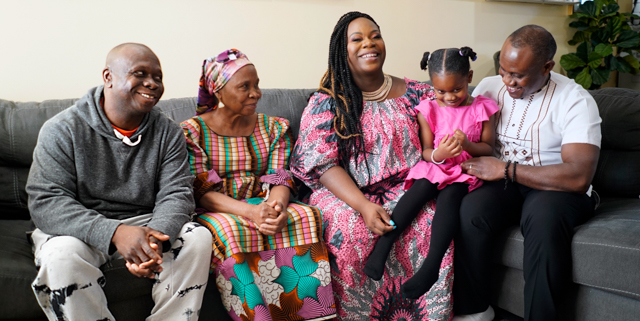UNHCR in the United States and the Northern Caribbean
UNHCR in the United States and the Northern Caribbean
Our staff engages with partners on refugee protection and stateless matters specific to the country, monitors compliance with international standards, contributes public comments on proposed regulations, submits “friend of the court” briefs on select issues, promotes awareness of the contributions of refugees, and conducts trainings and public presentations.

UNHCR provides information on the laws, policies and procedures for seeking asylum and related protection in the United States to asylum seekers – particularly those in immigration detention, non-governmental organizations, attorneys and others assisting asylum seekers. Staff also monitor detention conditions of asylum seekers and stateless individuals and work to promote the development and use of alternatives to detention.
Our staff work closely with U.S. government agencies and NGOs responsible for resettling refugees in the country, as well as support targeted projects that assist refugees.
UNHCR maintains communication with government partners at the Department of State, Department of Homeland Security, Department of Justice and other agencies, upholding and reinforcing our cooperative relationship.
The Northern Caribbean
In addition to the United States, UNHCR’s Multi-Country Office in Washington covers 18 Caribbean States and overseas territories: Antigua and Barbuda, the Bahamas, Barbados, Dominica, Dominican Republic, Grenada, Haiti, Jamaica, St. Kitts and Nevis, St. Lucia, St. Vincent and the Grenadines; the British overseas territories of Anguilla, Bermuda, British Virgin Islands, Cayman Islands, Montserrat, and Turks and Caicos Islands; and the Dutch overseas territory of the Kingdom of the Netherlands Sint Maarten.
UNHCR’s Office in The Hague oversees activities in Bonaire, Saba and St. Eustatius. UNHCR’s Office in Paris oversees activities in the French overseas departments of Guadeloupe, Saint Martin, Martinique and French Guiana. UNHCR’s Multi-Country Office in Panama oversees activities in the southern Caribbean countries of Belize, Guyana, Suriname, Trinidad and Tobago, Cuba, and the Dutch overseas territories of the Kingdom of the Netherlands Aruba and Curaçao.
The northern Caribbean region is confronted with an increasingly complex situation of mixed movements of people, including asylum seekers, refugees, victims of human trafficking, and stateless persons, along with other vulnerable populations.
Refugee Protection
While some northern Caribbean countries have ratified or acceded to the 1951 Convention Relating to the Status of Refugees and its 1967 Protocol, few currently have legislation, policies or regulations governing refugee protection and asylum. Additionally, territorial application of the 1951 Convention or the 1967 Protocol have not been extended in many of the overseas territories.
As a result, UNHCR engages in refugee status determination under its mandate. UNHCR staff conduct individual interviews with asylum seekers and examine country of origin information to determine if the applicant qualifies as a refugee in accordance with the 1951 Convention and 1967 Protocol.
In parallel, UNHCR works directly with governments within the northern Caribbean to develop effective refugee protection systems. UNHCR facilitates trainings to further capacity building, provides technical guidance and other support to government counterparts and advocates for refugee protection in line with international standards. UNHCR also promotes consistent approaches and responsibility-sharing mechanisms.
In the absence of applicable legislation or policies, and limited local integration prospects, resettlement to a third country often remains the only available durable solution for refugees in many Caribbean countries.
Statelessness
Statelessness in the northern Caribbean remains a major concern for UNHCR. UNHCR’s activities in the region aim to resolve the existing situations of statelessness and progressively eradicating statelessness throughout the region.
To achieve these goals, UNHCR provides support to those individuals who are stateless or who are at risk of statelessness by advocating for and assisting with naturalization procedures, obtaining documentation to verify their nationality or otherwise working to find solutions to their status.
UNHCR also provides technical advice on legislation concerning nationality and promotes the removal of gaps in laws and practices that may give rise to statelessness. UNHCR conducts advocacy to eradicate statelessness, including through promoting accession to the 1954 Convention relating to the Status of Stateless Persons and the 1961 Convention on the Reduction of Statelessness, and provides training and capacity building on the prevention and reduction of statelessness.
Partnerships
Throughout the northern Caribbean region, UNHCR works in close partnership with non-governmental organizations, UN agencies and a network of local organizations such as Red Cross national societies. UNHCR’s local partners often serve as the first point of contact for people forced to flee as well as stateless people. These partners also help identify asylum seekers, ensure access to refugee status determination procedures, provide humanitarian assistance and assist refugees in obtaining access to rights and services.

